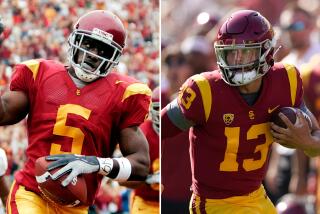Former Heisman Trophy winner Rashaan Salaam dead at 42
- Share via
Rashaan Salaam accomplished the improbable, rising from playing 8-man football at La Jolla Country Day in San Diego to win the Heisman Trophy in 1994.
It was Salaam’s greatest achievement, earned barely two months beyond his 20th birthday, and one that he candidly admitted in the ensuing years he couldn’t match.
Likable, outgoing and engaging, Salaam walked through much of his life with a smile, but the facade may have hid something darker.
On Monday night at a neighborhood park in Boulder, Colo., where Salaam played college football for the University of Colorado, the 42-year-old was found dead. In an interview with USA Today, Salaam’s mother, Khalada, said Boulder police told her they suspected suicide and found a note.
“They said they found a note and would share that with us when we get there,” Salaam’s mother said.
Salaam — who lived in Superior, Colo., about eight miles southeast of Boulder — went to Colorado after a standout career at La Jolla Country Day. He won the Heisman Trophy in his junior season after rushing for 2,055 yards. He also captured the Doak Walker Award as the nation’s top running back.
“Obviously, he was a La Jolla Country Day legend and a San Diego legend,” LJCD Athletic Director Jeff Hutzler said. “To lose anybody at 42 years of age, football great or not, is difficult.”
Remarkably, among the last 54 winners of the Heisman, dating back to Terry Baker in 1962, Salaam is the first to die.
Salaam’s last post on Facebook was on the Sunday after Thanksgiving, Nov. 27, and featured a link to a video featuring Whitney Houston, Luther Vandross, Dionne Warwick and Stevie Wonder singing, “That’s What Friends Are For.” Salaam wrote that he was “feeling joyful” and added, “Keep smiling.”
Sean Saadeh, who was Salaam’s quarterback at LJCD, remembered him Tuesday as a “friendly and dynamic guy. Always happy.
“I felt blessed every day to be able to play with a guy like him. He was such a special player, we always knew he was going to do great things at a higher level.”
To see a teammate from his 8-man team capture the Heisman was “surreal,” Saddeh said.
“But it didn’t really surprise me,” he added, “because he was such a great talent and such a hard worker.”
Salaam turned pro after his Heisman season and was a first-round draft choice of the Chicago Bears. He gained 1,074 yards and scored 10 touchdowns in his first year and was named NFC Rookie of the Year in 1995. But he wound up playing just three seasons for the Bears.
In 1999, Salaam admitted a marijuana addiction contributed to his career downfall. He lost 14 fumbles in 31 games and told ESPN he thought the issue was related to marijuana.
“It probably had me out there lackadaisical instead of being out there 100 percent,” he said then. “Everybody thinks getting high is cool, you can let it go when you want to let it go. But it’s just as potent as alcohol. It’s just as potent as cocaine.”
Salaam broke his leg in the third game of the 1997 season and said the injury increased his addiction.
Salaam also told ESPN he entered a rehabilitation program early in 1998. Later that year he was released by the Bears.
“It was hard,” he said. “It was embarrassing. My pride was shot. It was just a nightmare to be 23 years old and out of football. I couldn’t believe what was going on.”
In 1999, Salaam had a training camp stint with the Oakland Raiders and later joined the Cleveland Browns, but played in just two games before he was cut.
In 2001, Salaam re-emerged in the XFL, the pro league that lasted one season. He played for Memphis, averaging 4.6 yards per carry while scoring five TDs. But even that season was shut down because of a shoulder injury.
Salaam attempted another comeback in 2003, moving from San Diego to Boca Raton, Fla., to work out at Chris Carter’s FAST Program. After ballooning to 240 pounds, he worked himself down to 220 and contended he was in the best shape of his life.
“It isn’t about the money,” Salaam said in a 2003 interview with the Union-Tribune. “My heart says it’s not over for me. I want to play in the NFL again.”
He never had another chance with an NFL team.
In the ‘03 Union-Tribune interview, Salaam said the money from his original $3.8 million NFL contract had been “safely” invested. However, in 2011, the Denver Post reported Salaam sold his Heisman Trophy ring, through an auction house, for $8,140. The ring was said to have several diamonds, but was missing one.
In a December 2014 story, the Denver Post interviewed Salaam and reported he was working in the Boulder community and “teaching kids the story of what made Rashaan Salaam so great, and what made Rashaan Salaam a what-if.”
Salaam has been on the ballot for the College Football Hall of Fame since 2014. The 2017 class will be announced Jan. 6.
Salaam grew up in San Diego’s Skyline neighborhood and his mother had to be convinced to let him play football because she wanted him to focus on academics. But football also was in Rashaan’s blood. His father was Teddy Washington, a talented running back who played at San Diego State in 1966-67.
ALSO
Heisman Trophy: Jackson, Watson, Peppers and two Sooners named finalists
Sheriff goes on tirade as man is charged in fatal shooting of former USC star Joe McKnight
USC gets flowery treat for new year: Rose Bowl matchup with Penn State
More to Read
Go beyond the scoreboard
Get the latest on L.A.'s teams in the daily Sports Report newsletter.
You may occasionally receive promotional content from the Los Angeles Times.










